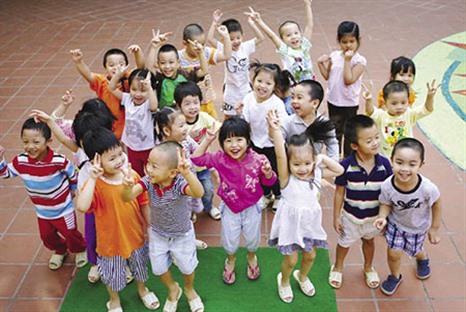 Society
Society

A campaign to end physical violence against children at home and at school was launched on Wednesday morning.
 |
| Children play in a kindergarten in Hà Nội. Experts agree that taking care of and protecting children need co-operation of the whole society. — Photo molisa.gov.vn |
HÀ NỘI — A campaign to end physical violence against children at home and at school was launched on Wednesday morning.
The event, organised by the World Vision (WV) Việt Nam and the Ministry of Labour, Invalids and Social Affairs (MoLISA), aimed at raising people’s awareness and encouraging the community to join hands in building a safe atmosphere for children.
The event was in response to the five-year global campaign on ending physical violence against children started by the International WV.
During the event, representatives shared information and experiences about physical violence against children and measures to protect them against such violence at home and in school, the two places that are especially important for the development and personality-forming of children.
The experts agreed that in recent times, Vietnamese people have made significant changes and are more aware about the issue. Many parents and teachers have also put in a lot of effort to apply modern educational methods. However, the changes are not equal across different social backgrounds.
The latest report of the Department of Child Care and Protection under the MoLISA showed that from 2012 to May this year, 698 cases of violence against children were reported, and more than 90 per cent of them were cases of physical violence.
Nearly 51 per cent of the victims were under the age of 10 and as many as 63 per cent of the victims faced violence from within their families.
Warren Climenhaga, an expert from the WV, said that physical violence could not be solved by any single organisation or individual, and that it needed the co-operation of everybody.
Trần Thu Huyền, national director for WV Việt Nam, said, “When parents and teachers are careful in their behaviour while dealing with children, the effectiveness will spread to the society, and the society will become safer for the children to grow up in.”
Lương Thị Quỳnh, ambassador children of the initiative, said, “Rods make us more taciturn and hard-headed. I’m afraid that later, children will imitate the behavior of adults in using violence to resolve problems. I hope that parents and teachers will use advice to encourage children, instead of rods.” — VNS




